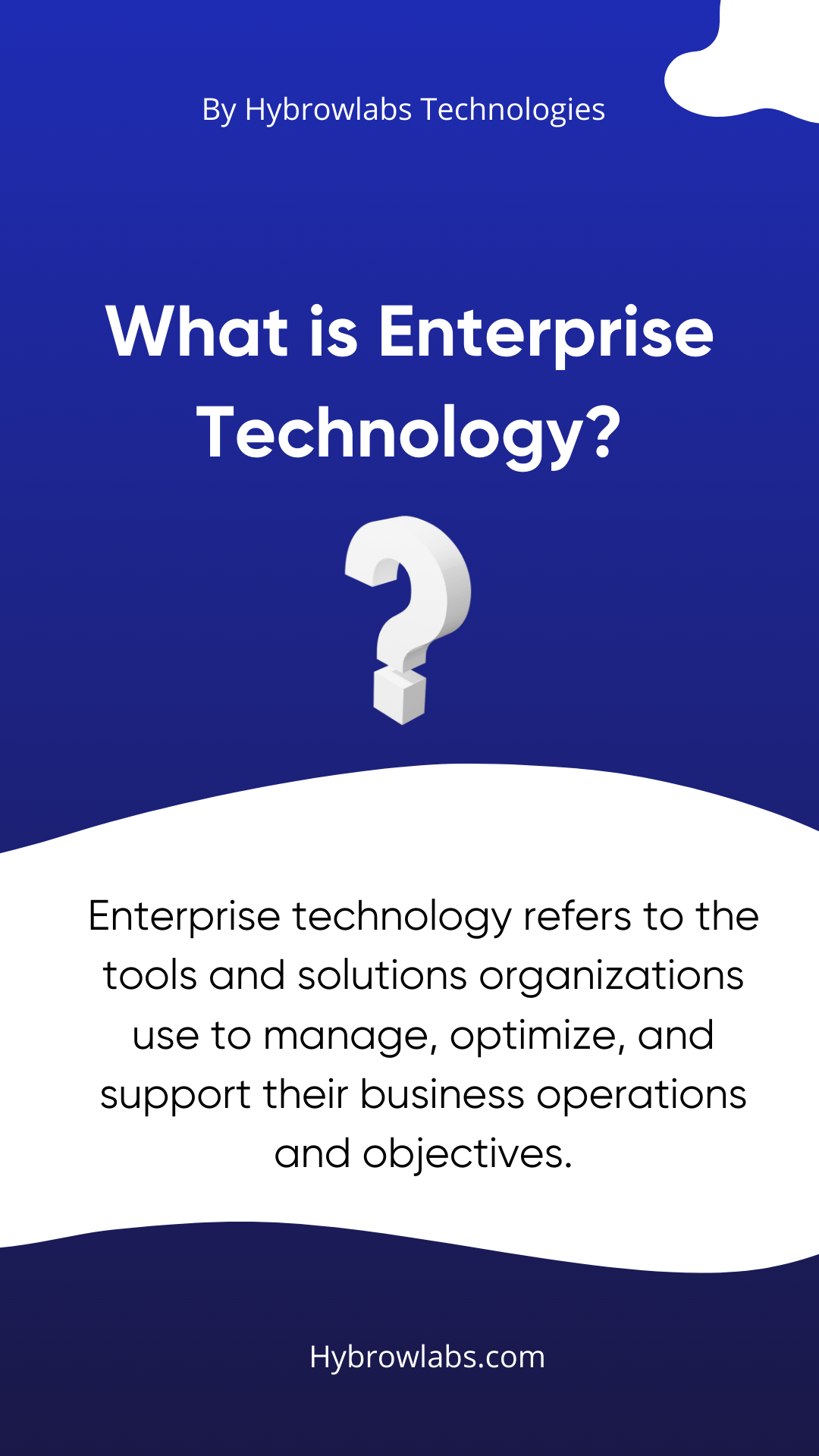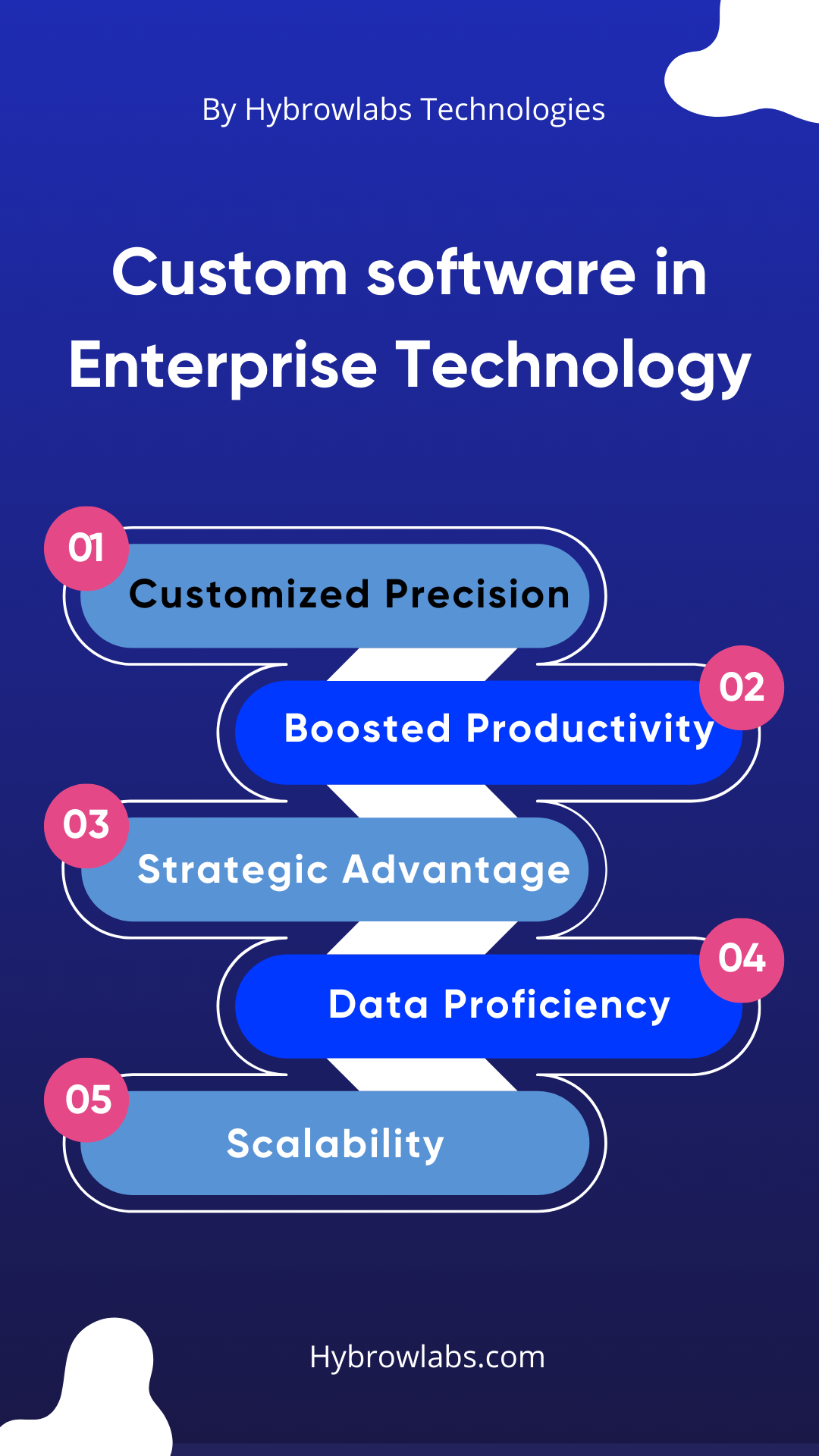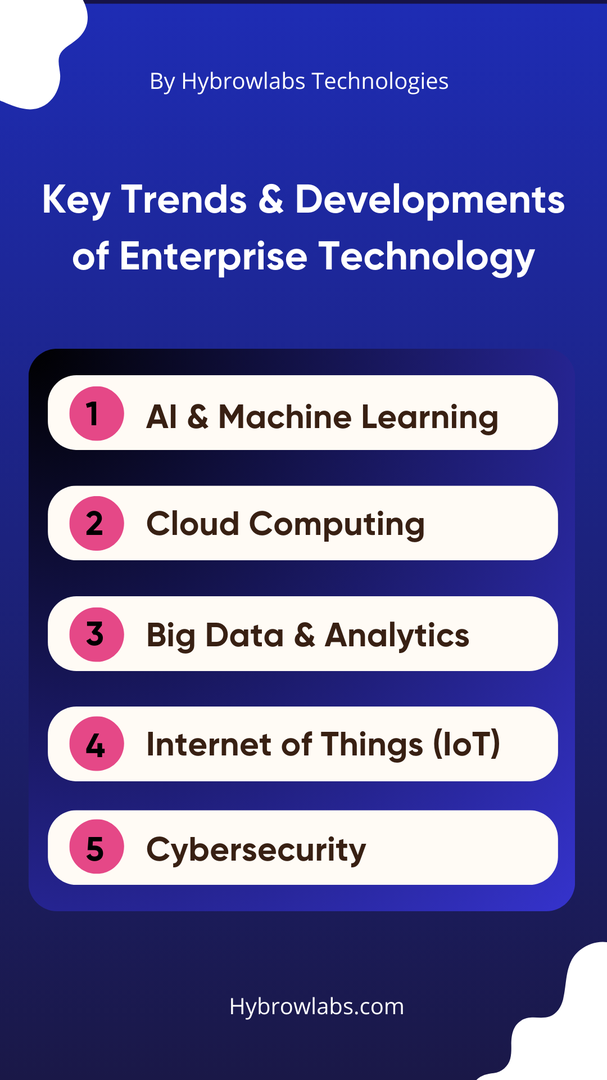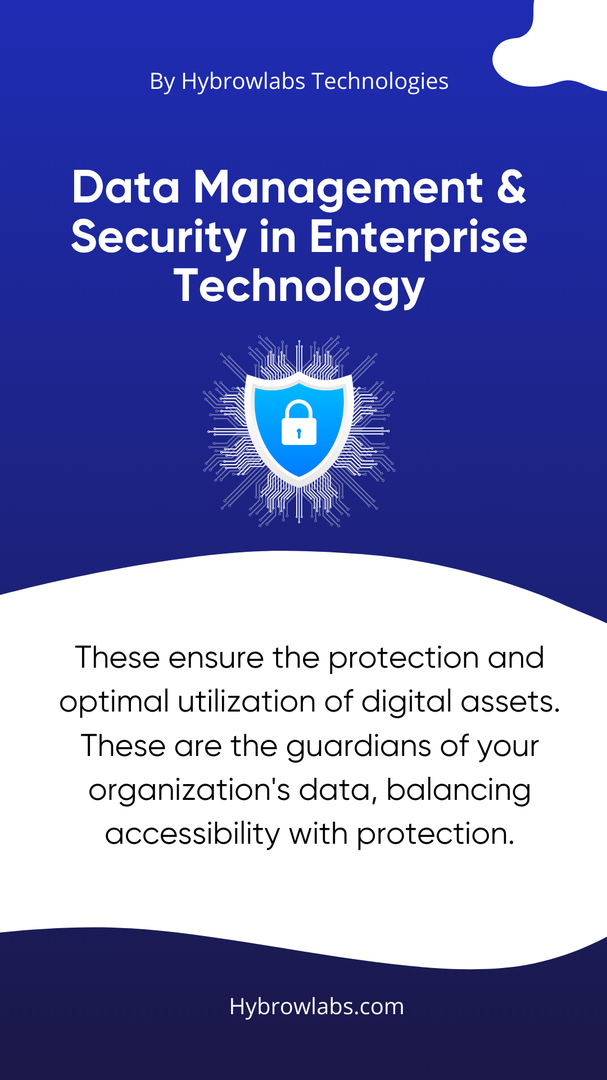Enterprise technology is more than a trend in today's fast-paced world; it is a key component in the success stories of both large and small businesses. It's what makes small businesses into market leaders & keeps the established players competitive. Starting from the ground up, we'll unveil the mysteries of corporate technology in this blog. We'll delve deep into topics ranging from custom software to the mind-boggling worlds of AI, cloud computing, and IoT. And don't forget about cybersecurity, which is critical because we don't want any digital pirates on this journey! Ready? Let's take a look at the blog!
Understanding Enterprise Technology:

Enterprise technology, usually referred to as enterprise IT (Information Technology), contains a vast range of hardware, software & services that organizations use to support their business functions & achieve their goals. It is a broad term that contains all the technology tools & solutions operated by both large & small businesses, to manage their processes, data, communication & overall digital infrastructure.
Here's a breakdown of the key components & aspects of enterprise technology:
1. Hardware:
This includes the physical equipment & devices used in business settings, such as servers, computers, networking equipment & storage devices. These components form the foundation of an organization's IT infrastructure.
2. Software:
Enterprise software includes applications & programs tailored for business use. This can range from office productivity software (like Microsoft Office) to specialized software for various functions such as customer relationship management (CRM), enterprise resource planning (ERP) & data analytics.
3. Networking:
Networking technologies & solutions enable data to flow seamlessly within & outside the organization. This includes local area networks (LANs), wide area networks (WANs) & internet connectivity. Networking is crucial for communication, data sharing & accessing cloud services.
4. Cloud Computing:
Cloud services provide scalable & on-demand access to computing resources, data storage & software applications over the internet. Cloud computing allows businesses to reduce infrastructure costs, enhance agility & access advanced technologies without significant upfront investments.
5. Data Management and Analytics:
Managing & analyzing data is central to enterprise technology. Organizations collect, store & analyze vast amounts of data to make informed decisions, identify trends & gain insights that can drive business strategies.
6. Security:
Cybersecurity is an integral part of enterprise technology. Protecting data, systems & networks from threats, breaches & unauthorized access is paramount. Security measures include firewalls, encryption, access controls & threat detection systems.
7. Communication and Collaboration Tools:
Enterprise technology also encompasses tools for internal and external communication, such as email systems, video conferencing, instant messaging & collaborative platforms. These tools facilitate teamwork & efficient communication within organizations.
8. Custom Software:
Many organizations develop custom software applications tailored to their specific needs. These applications can automate processes, enhance productivity & provide a competitive advantage.
9. Emerging Technologies:
Enterprise technology constantly grows. As organizations explore their potential applications, emerging technologies like artificial intelligence (AI), machine learning, the Internet of Things (IoT) & blockchain are becoming increasingly crucial.
Custom software: The Engine of Enterprise Technology

In enterprise technology, custom software refers to software applications & solutions that are specially created & developed to fit the individual demands, specifications & operations of a given organization or business. Custom software is made specifically to fulfill the needs & goals of a single commodity, as opposed to off-the-shelf software, which is pre-built and often intended to serve a wide range of customers.
Here are some key characteristics & aspects of custom software in the context of enterprise technology:
1. Customized Precision:
Enterprise technology contains a variety collection of software applications, from off-the-shelf solutions to open-source platforms. While these can be extremely effective, they often come with generic features that may not align perfectly with your organization's workflow. This is where custom software steps in, confirming every digital tool is fine-tuned to improve your specific operations.
2. Boosted Productivity:
In today’s business landscape, efficiency is the name of the game. Custom software is like the turbocharger of enterprise technology, optimizing processes, eliminating bottlenecks & boosting productivity. It automates routine tasks, reducing manual labor & human error & freeing up your team to focus on more strategic endeavors.
3. Strategic Advantage:
Staying ahead in today's competitive landscape requires innovation. Custom software allows you to innovate by creating unique features & functionalities that give your organization a competitive edge. It enables you to respond swiftly to changing market dynamics & customer needs.
4. Data Proficiency:
Data is the lifeblood of modern enterprises & custom software ensures that you can collect, store, analyze & interpret data precisely the way you need. It delegates data-driven decision-making by delivering tailored insights that can be used to improve strategies & drive growth.
5. Scalability and Flexibility:
Your technology should develop together with your business. Custom software is highly scalable & flexible, adjusting to your changing requirements without the limitations often associated with off-the-shelf solutions. It grows with your business, assuring that your technology stays an asset rather than a burden.
Key Trends and Developments of Enterprise Technology:

1. Artificial Intelligence (AI) and Machine Learning:
AI and machine learning are rapidly transforming industries & businesses. Companies are using AI to automate tasks, improve decision-making & create new products and services. This is leading to increased productivity, efficiency & profitability. For example, AI-powered chatbots are being used to automate customer service tasks & machine learning is being used to improve the accuracy of fraud detection systems.
2. Cloud Computing:
Cloud computing is another rapidly growing trend. Companies are moving their data & applications to the cloud to benefit from scalability, flexibility & cost savings. Cloud computing is also helping new business models like software as a service (SaaS) & platform as a service (PaaS). Cloud computing is making it easier & more affordable for businesses to start up & scale up. This is leading to a more competitive & innovative business landscape. For example, cloud computing is enabling startups to compete with large incumbents by providing them with access to the same resources & technologies.
3. Big Data and Analytics:
Companies are collecting & analyzing more data than ever before. Big data & analytics are helping companies to understand their customers better, make better decisions & improve their operations. This is leading to improved customer satisfaction & loyalty. For example, businesses are using big data to develop personalized product recommendations & targeted marketing campaigns.
4. Internet of Things (IoT):
The IoT is a network of physical objects that are linked to the internet & can accumulate & exchange data. The IoT is transforming industries & businesses by enabling new applications & services. This is leading to new revenue streams & opportunities for innovation. For example, the IoT is being used to develop smart manufacturing solutions that can improve productivity & quality.
5. Cybersecurity:
Nowadays cybersecurity is a top priority for businesses of all sizes. As cyberattacks become more sophisticated, companies are investing in new technologies & solutions to protect their data & systems. Cybersecurity is becoming more important as businesses depend more & more on digital technologies. This helps lead to a more secure & alert business environment.
Here are a few examples of how businesses are using the key trends & developments listed above:
- Netflix: Netflix uses AI & machine learning to recommend the choice movies & TV shows to its users. This helps Netflix to improve customer satisfaction & engagement.
- Amazon: Amazon uses cloud computing to power its e-commerce platform. This allows Amazon to scale its business fast & efficiently.
- Walmart: Walmart uses big data and analytics to optimize its supply chain & improve product placement in its stores. This helps Walmart to reduce costs & improve customer satisfaction.
Data Management and Security in Enterprise Technology:

Data management & security are the twin pillars upon which modern organizations build their digital empires. With robust data management practices, you can harness the full potential of your data, making informed decisions & gaining a competitive edge. with great data comes great responsibility & that's where data management & security come into play.
A. Data Management: The Art of Organizing Chaos
Imagine your organization's data as a vast library filled with books of endless knowledge. Data management is like the librarian who meticulously categorizes, indexes & ensures easy access to those books. Here's how it plays out:
a) Data Collection:
Every day, organizations collect a deluge of data from various sources – customer interactions, transactions, sensors & more. Data management involves efficiently gathering, storing & cataloging this information.
b) Data Storage:
Data needs a home, and that's where storage systems, both on-premises & in the cloud, come into play. Data storage solutions must ensure data accessibility, scalability & reliability.
c) Data Organization:
Organizing data is akin to arranging books on library shelves. It involves structuring data into databases, tables & categories for easy retrieval & analysis.
d) Data Quality:
Just as a library needs to maintain the quality of its books, data must be accurate, complete & consistent. Data management includes processes for data cleansing & validation.
e) Data Accessibility:
Data should be accessible to authorized users when they need it. Access controls, permissions & user authentication are part of ensuring data security while enabling access.
B. Data Security
a) Data Encryption:
Encryption transforms your data into an unreadable code, even if it's intercepted. It ensures that only those with the encryption key can decipher & access the data.
b) Access Controls:
Just as a fortress has guarded entrances, data security sets up access controls to restrict data access to authorized individuals. This minimizes the risk of unauthorized data breaches.
c) Firewalls and Intrusion Detection:
Firewalls act as castle walls, blocking unauthorized network access. Intrusion detection systems are like vigilant sentries, alerting you to any suspicious activities.
d) Regular Auditing:
Like fortresses undergo regular security checks, data security practices require regular auditing to identify vulnerabilities & ensure security measures are up-to-date.
e) Data Backups:
In case of an attack or data loss, backups serve as your safety net. Regularly backing up data ensures recovery options, even in dire circumstances.
Conclusion:
As we look to the future, one thing is certain: the role of data in shaping business success will only grow. Embrace the latest technologies, but never forget that your data is your most valuable treasure. Handle it with care, manage it with precision & guard it with unwavering vigilance. In the dynamic world of enterprise technology, your data is your compass, guiding you toward a future filled with possibilities.
Hybrowlabs excels in custom software development, data analytics & cybersecurity. With our expertise, we can tailor solutions to your needs, protect your data & provide insights for informed decisions, ensuring your organization thrives in the digital age. So contact us today!
FAQ:
1. What is enterprise technology?
Enterprise technology refers to a broad range of hardware, software & solutions used by organizations to support their business operations & objectives. It includes tools for data management, communication, security & more.
2. Why is data management important for businesses?
Effective data management ensures that data is organized, accurate & accessible. It enables informed decision-making, enhances operational efficiency & supports compliance with data privacy regulations.
3. How can custom software benefit my organization?
Custom software is tailored to your specific needs, improving efficiency, automating processes & providing a competitive edge. It ensures that your technology aligns perfectly with your business goals.
4. What are the most important security measures that any company needs to take?
Strong access controls, frequent security audits, data encryption, employee training & the deployment of firewalls & intrusion detection systems to protect against cyber threats are among the most important cybersecurity measures.
5. What is the role of data analytics in business?
Data analytics involves examining data to uncover insights, trends & patterns that can inform strategic decisions. It helps businesses optimize operations, improve customer experiences & gain competitive advantage.



aab377.png)


a3dc85.jpg)

.jpg)
fd8f11.png)

.jpg)
.jpg)